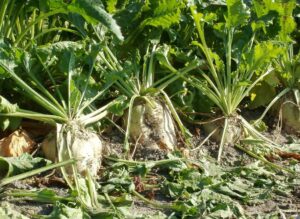Andres Haro
Significant amounts of fruits and vegetables from agricultural produce are yearly discarded as a result of poor conservation. This generates large amounts of fruits and vegetables waste whose disposal results in an environmental challenge worldwide.
Turning them into ruminant feed could take care of this problem while substituting other feedstuffs in ruminant diets. Sodium metabisulfite is a food preservative used by the animal feed industry to inhibit the growth of fungi, yeasts and bacteria.
Can sodium metabisulfite help to preserve fruit and vegetable discards for ruminant feeds?
The Konkuk University in Seoul, South Korea, recently evaluated the inclusion of waste fruits and vegetables preserved with sodium metabisulfite in sheep total mixed rations (Ahmadi et al., 2020). Among the parameters tested were ruminal fermentation, intestinal digestibility, blood metabolites and feed intake.
Fruit refusals consisted of lemons, tomatoes, and plums (20.6, 16.1, 14.4% of the total, respectively), whereas vegetables were onions, potatoes, sweat potatoes, green onions stalks and paprika (22.4, 17.2, 5.3, 2.2 and 1.8% percent of the total, respectively). The preserving agent used was sodium metabisulfite at the rate of 6 g/kg on a wet basis. The treated food waste was preserved outdoors for 7 days and then analyzed for crude protein (12.9%) and fat (2.89%).
The produce waste was then minced and mixed with the rest of the ingredients (basal diet) into total mixed rations. The basal diet was composed of timothy hay, corn gluten feed, corn grain, and almond hulls (40, 35, 17, and 6%, on a dry basis, respectively). Preserved waste produce was included at 0, 1.9, 3.8, and 5.7% on a dry basis to formulate four total mixed rations (14.2% crude protein and 1.55% fat).
Two experiments were run:
- In vitro. Rumen fluid was collected from two cannulated steers to measure gas production and ruminal metabolites of total mixed diets (RUSITEC).
- In vivo. Four adult rams housed in individual metabolism crates were randomly assigned to the four total mixed rations, to measure apparent nutrient digestibility, N-metabolism, and feed intake.
No negative changes in food intake, nutrient digestibility, nitrogen metabolism, and blood metabolites
The inclusion of sodium metabisulfite did not affect nutrient composition of the fruit/vegetable refusals after a 7-day preservation. Lower microorganism concentrations (Lactic acid bacteria, yeasts and molds) were observed after the 7-day preservation. The basal rations added treated refusals maintained an average pH of 6.52, regardless of their inclusion rate. In addition, the rate of inclusion of refusals did not affect in vitro true organic matter degradability or NH3-N after 24 hours of fermentation.
The addition of treated fruit and vegetable waste did not affect feed intake, apparent nutrient digestibility, nitrogen metabolism, and blood metabolites. These results suggest that the partial inclusion of discarded fruits and vegetables preserved with sodium metabisulfite could partially replace cereal grains as an energy source for ruminants, while also contributing to the disposal of solid waste form the agricultural industry.
Reference:
Ahmadi, F., Lee, W.H., Oh, Y.K., Park, K., Kwak, W.S. 2020. Fruit and vegetable discards preserved with sodium metabisulfite as a high-moisture ingredient in total mixed ration for ruminants: effect on in vitro ruminal fermentation and in vivo metabolism. Asian-Australasian Journal of Animal Sciences. 33(3): 446.
© 2020 Dairy Knowledge Center, LLC. All Rights Reserved.








